|
|
|
Sort Order |
|
|
|
Items / Page
|
|
|
|
|
|
|
| Srl | Item |
| 1 |
ID:
104990
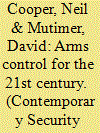

|
|
|
|
|
| Publication |
2011.
|
| Summary/Abstract |
In the past two decades there has been an extensive reconceptualization of security and its associated practices, but there has been scant attention to questions of arms and their control. This article, and those which follow, seek to start a conversation about the control of the means of violence. We begin by drawing on the metaphor of arms control as science fiction in order to highlight notable features of the classical arms control literature. The article then discusses the ways contemporary arms control practice has evolved from a Cold War focus on parity and mutual vulnerability to a global control architecture characterized by the pursuit of absolute security via an ever-expanding range of non-proliferation initiatives aimed at rogues, rebels and terrorists. Consequently, in its post-Cold War, post-9/11 mode, contemporary arms control practice has been transformed into a form of global counter-insurgency. We suggest that the term controlling the means of violence (CMV) better captures the wide range of control initiatives that can be deployed to limit the instruments of armed violence. Finally, we summarize the arguments set out in the rest of the special issue and outline the future directions for research and activism suggested both by the papers collected in this volume and the broader discussions in the conferences that gave rise to them.
|
|
|
|
|
|
|
|
|
|
|
|
|
|
|
|
| 2 |
ID:
049058
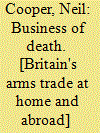

|
|
|
|
|
| Publication |
London, I.B.Tauris and Company, 1997.
|
| Description |
xiii, 226p.Hardbound
|
| Standard Number |
1850439532
|
|
|
|
|
|
|
|
|
|
|
|
Copies: C:1/I:0,R:0,Q:0
Circulation
| Accession# | Call# | Current Location | Status | Policy | Location |
| 039916 | 382.4562340941/COO 039916 | Main | On Shelf | General | |
|
|
|
|
| 3 |
ID:
114997
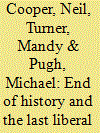

|
|
|
|
|
| Publication |
2011.
|
| Summary/Abstract |
In the April 2010 Review of International Studies, Roland Paris argued that liberal peacebuilding is the only viable solution for rebuilding war-torn societies, and supported this by assailing critics of the liberal peace. In this article we challenge four key claims made by Paris: imposed and consensual peacebuilding are different experiences; there are no echoes of imperialism in modern peacebuilding; there is no alternative to the capitalist free market; and critics of the liberal peace are 'closet liberals'. We argue that Paris ignores the extent to which all peacebuilding strategies have had a core of common prescriptions: neoliberal policies of open markets, privatisation and fiscal restraint, and governance policies focused on enhancing instruments of state coercion and 'capacity building' - policies that have proved remarkably resilient even while the democracy and human rights components of the liberal peace have been substantially downgraded. There is little space to (formally) dissent from these policy prescriptions - whether international peacebuilders were originally invited in or not. Furthermore, the deterministic assumption by Paris that 'there is no alternative' is unjustifiable. Rather than trying to imagine competing meta-alternatives to liberalism, it is more constructive to acknowledge and investigate the variety of political economies in post-conflict societies rather than measuring them against a liberal norm.
|
|
|
|
|
|
|
|
|
|
|
|
|
|
|
|
| 4 |
ID:
105001
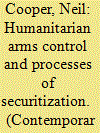

|
|
|
|
|
| Publication |
2011.
|
| Summary/Abstract |
This article undertakes a critical analysis of what have been labelled humanitarian arms control (HAC) initiatives, most notably, recent agreements to ban cluster munitions and landmines as well as efforts to restrict the proliferation of small arms. The article critiques conventional accounts that view such initiatives as illustrating the potential of global civil society to interject human security concerns into the domain of arms regulation through the exercise of bottom-up power. In order to do this, the article first outlines the concept of securitization, particularly Floyd's discussion of positive and negative forms of securitization and Abrahamson's concept of the security continuum. This is used to frame an analysis of contemporary HAC initiatives that locates them in the much longer history of pariah weapons regulation and the way it relates both to the framing of legitimized weapons and changes in the broader regulation of the conventional defence trade in different eras. In contrast to conventional accounts of the HAC agenda, it is argued that initiatives such as those on landmines and cluster munitions were successful precisely because they were consonant with the same discourse used to legitimize both post-Cold War liberal interventionism and the new generation modern high-tech weapons. Moreover, the extra-securitization of landmines, cluster munitions and small arms has been accompanied by the (relative) desecuritization of the trade in major conventional weapons and associated dual-use technologies, a process that has a number of quite negative effects in terms of arms trade regulation. The article concludes by reflecting on the implications of the preceding analysis both for thinking about processes of securitization and for arms trade non-governmental organizations (NGOs).
|
|
|
|
|
|
|
|
|
|
|
|
|
|
|
|
| 5 |
ID:
067306
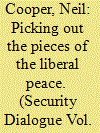

|
|
|
| 6 |
ID:
071470
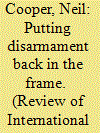

|
|
|
|
|
| Publication |
2006.
|
| Summary/Abstract |
This article begins by deconstructing the dominant discourse on arms control and disarmament, and argues that it works to dismiss disarmament as an idea whilst simultaneously coopting really existing disarmament into a perspective that imagines a world long on dangers and short on peaceful strategies to confront them. In contrast, it is argued, not only is the traditional distinction between arms control and disarmament problematic but, in certain respects, the world is experiencing quite a lot of disarmament. Partly however, this is because both disarmament and broader arms limitation activities are taking place as part of an asymmetrical arms limitation system underpinned, in particular, by the US in its role as a 'disarmament Empire'. Nevertheless, there are a number of factors immanent in the contemporary international system that suggest a more radical form of emancipatory disarmament might be both realisable and indeed necessary.
|
|
|
|
|
|
|
|
|
|
|
|
|
|
|
|
| 7 |
ID:
162764
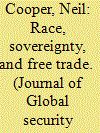

|
|
|
|
|
| Summary/Abstract |
This paper contributes to the literature on norms, arms regulation, humanitarian arms control, and arms control as governmentality by examining the different “Matryoshka dolls” of arms trade governance as they operated in the late nineteenth century. I suggest that analysis of practices in this era has relevance for debates about contemporary arms governance. The innermost doll is represented by a specific regulatory initiative, in this case, the 1890 Brussels Act, which represented an attempt to graft a regulatory arms trade norm onto an established and constitutive anti-slavery norm. The Act was also located within the second matryoshka doll, the broader approach to arms trade prohibition adopted in an era. Despite representations of the period as one of free trade in arms, I highlight extensive efforts to restrict the transfer of firearms to colonial subjects. Finally, I examine the third matryoshka doll, the way in which mechanisms of prohibition and permission constitute the practices of arms control as governmentality—the effort to define and manage which gradations of people can legitimately own, trade, and use which gradations of weapons in what contexts. Overall, the paper challenges the optimistic literature regarding humanitarian arms control and arms trade norms with three concluding implications: the merging of humanitarianism and arms control can reflect both good and bad norms; such a confluence is not necessarily incompatible with colonialism, racism, or imperial violence; and, such a merger is consonant with the maintenance of liberal militarism.
|
|
|
|
|
|
|
|
|
|
|
|
|
|
|
|
| 8 |
ID:
115280
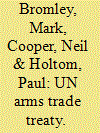

|
|
|
|
|
| Publication |
2012.
|
| Summary/Abstract |
The UN conference to negotiate an Arms Trade Treaty (ATT) concluded on 27 July 2012 without reaching consensus on the text of a draft treaty and saw both the US and Russia calling for more time to negotiate. The ATT process marks the latest in a series of attempts to insert human security concerns into arms export controls. The setback in July raises questions about the current level of international support for the human security agenda, as well as the relative power of different actors to shape global governance structures. This article locates the ATT negotiations in the broader history of multilateral efforts to regulate the international arms trade, from the 1890 Brussels Act to post-Cold War initiatives. The historical record shows that such efforts are more likely to succeed if they are negotiated or imposed by major arms exporters. The introduction of human security concerns, as well as the merging of export control and arms control agendas, went some way towards reversing this trend. In particular, it created a broad international coalition of supportive states and NGOs from the global North and South. Yet disagreements over the purpose of an ATT remained. The draft ATT included human security provisions, but China, Russia, the US and a number of emerging powers ensured that state security considerations remained paramount in decision-making on arms exports. The US was the first major actor to announce its unwillingness to sign the draft ATT in July 2012 and two alternative interpretations of US actions are considered. The article concludes by considering the options available to supporters of the ATT process following the 2012 conference and examines the notion that the ATT campaign has become an initiative 'out of its time', one that might have had success in the 1990s but not in current circumstances.
|
|
|
|
|
|
|
|
|
|
|
|
|
|
|
|
| 9 |
ID:
051255
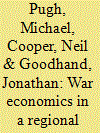

|
|
|
|
|
| Publication |
London, Lynne Reinner, 2004.
|
| Description |
xiii, 273p.
|
| Series |
Project of the International Peace Academy
|
| Standard Number |
1588262111
|
|
|
|
|
|
|
|
|
|
|
|
Copies: C:1/I:0,R:0,Q:0
Circulation
| Accession# | Call# | Current Location | Status | Policy | Location |
| 048140 | 330.9/Pug 048140 | Main | On Shelf | General | |
|
|
|
|
| 10 |
ID:
155009
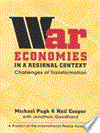

|
|
|
|
|
| Publication |
New Delhi, Viva Books, 2017.
|
| Description |
xiii, 273p.: ill.pbk
|
| Series |
Project of the International Peace Academy
|
| Standard Number |
9789386385888
|
|
|
|
|
|
|
|
|
|
|
|
Copies: C:1/I:0,R:0,Q:0
Circulation
| Accession# | Call# | Current Location | Status | Policy | Location |
| 059175 | 330.9/PUG 059175 | Main | On Shelf | General | |
|
|
|
|
| 11 |
ID:
072630
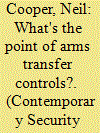

|
|
|
|
|
| Publication |
2006.
|
| Summary/Abstract |
This essay examines the contemporary architecture of conventional arms transfer restrictions and concludes that it is deficient. In part this is simply due to the absence of political will to effectively implement existing arms transfer restraint. However, it is also the case that the globalization of the defense industry, the growing employment of dual-use technology and the pervasiveness and flexibility of illicit networks are, in combination, substantially eroding the utility of existing restrictions on arms circulation. It is argued, therefore, that such trends require a shift from a predominantly supplier-oriented model of restriction to a system of regulatory diffusion that matches the reality of arms diffusion in the international system. Such a system encompasses a variety of initiatives but particularly includes a greater emphasis on recipient initiatives, an enhanced role for civil society and the incorporation of an outputs/impacts model of arms regulation.
|
|
|
|
|
|
|
|
|
|
|
|
|
|
|
|
|
|
|
|
|